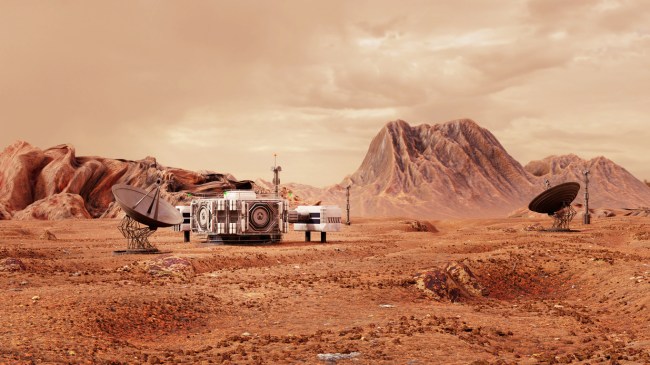
iStockphoto / dottedhippo
The concept of colonizing another planet has been a dream for humans for hundreds of years and has been the subject of science-fiction movies for decades. While modern-day dreamers such as Jeff Bezos and Elon Musk believe they will pave the way for humans to live on another planet. However, a Nobel Prize-winning astrophysicist has come out to declare that humans will never live on another planet.
Michel Mayor is a 77-year-old Swiss astrophysicist who was a co-winner of the Nobel Prize in physics along with Didier Queloz this year for discovering a gas giant planet orbiting a sun-like star outside of our solar system back in October of 1995 from the Haute-Provence Observatory in southern France. At the time, this was the first exoplanet ever discovered and named 51 Pegasi b.
Mayor, who was a professor at the University of Geneva’s Department of Astronomy, is a wet blanket when it comes to extraterrestrial colonization.
“If we are talking about exoplanets, things should be clear: We will not migrate there,” Mayor said told Agence France-Presse (AFP). Which maybe we should listen to the man since he discovered exoplanets.
RELATED: NASA Discovers 219 Exoplanets And 10 Planets Are Earth-Like That Could Support Life
Mayor gave a very logical reason why humans won’t be migrating to these Earth-like exoplanets at the edge of our solar system — time.
“These planets are much, much too far away,” he explained. “Even in the very optimistic case of a livable planet that is not too far, say a few dozen light-years, which is not a lot, it’s in the neighborhood, the time to go there is considerable. We are talking about hundreds of millions of days using the means we have available today… It’s completely crazy.”
To illustrate Mayor’s point, you need to understand that one light-year is equal to 5,878,625,373,183 miles. Next, how far are these Earth-like exoplanets? There are currently 4,118 known exoplanets. But these exoplanets are so far away that their distance is generally measured in parsecs, which is about 3.26 light-years or approximately 19 trillion miles.
The closest exoplanet that might be habitable is Proxima Centauri b, which orbits Proxima Centauri, the star closest to our Sun. Proxima Centauri b, which was discovered in 2016 and is believed to be in a habitable zone to its star, is still 4.24 light-years away from Earth.
The astrophysicist said he felt the need to “kill all the statements that say, ‘OK, we will go to a livable planet if one day life is not possible on Earth.'” Mayor stressed that “we must take care of our planet.” He added, “It is very beautiful and still absolutely livable.”
RELATED: In New Study, Scientists Say Alien Civilizations Have Already Visited Earth
Mayor is not the only person putting the kibosh on colonizing exoplanets. Stephen Kane, a professor of planetary astrophysics at the University of California in Riverside, told Live Science: “The sad reality is that, at this point in human history, all stars are effectively at a distance of infinity. We struggle very hard as a species to reach the Earth’s moon.”
So it looks like we’re stuck with Earth, and Earth is stuck with us. So we should probably not destroy it or obliterate each other because this is the only planet we’ve got. Unless… we figure out how to use black holes to travel through intergalactic space or invent a warp drive.
You can read more space news HERE.
RELATED: Scientists Discover Enormous Planet That Is ‘Unlike Any Other Exoplanets’ They Have Ever Seen
[FoxNews]